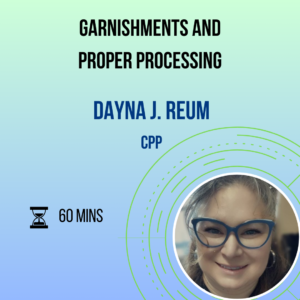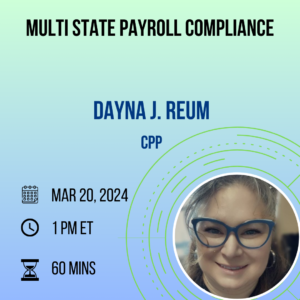Marketing and Empathy Psychology
Payroll Compliance Bundle Pack
Lorem ipsum dolor sit amet, consectetur adipiscing elit. Ut elit tellus, luctus nec ullamcorper mattis, pulvinar dapibus leo.

Tab #1
Tab #2
Tab #2
Tab #1
Lorem ipsum dolor sit amet, consectetur adipiscing elit. Ut elit tellus, luctus nec ullamcorper mattis, pulvinar dapibus leo.
Tab #2
Lorem ipsum dolor sit amet, consectetur adipiscing elit. Ut elit tellus, luctus nec ullamcorper mattis, pulvinar dapibus leo.
Tab #2
Lorem ipsum dolor sit amet, consectetur adipiscing elit. Ut elit tellus, luctus nec ullamcorper mattis, pulvinar dapibus leo.
Webinar 1
Webinar 2
Webinar 3
Webinar 4
Webinar 1
Multi State Payroll Compliance
- DURATION : 60
- DATE / TIME(EST) : July 16, 2025 | 1:00 pm
- SPEAKER : Dayna J. Reum, CPP
Understanding how to calculate tax for employees in 2 or more states can be confusing. Plus what state laws for payroll need to be followed when employing employees in more than one state.
To better understand the laws in each state and the tax guidance on how to determine taxation when employees live in one state and work in another. Or for employees that work in multiple states for travel for work. Also other state laws that affect payroll will be discussed.
This webinar will discuss how to deal with the complicated multi state taxation concerns when creating a remote work policy. Along with temporary COVID-19 legislation that has impacted multi state concerns. We will also cover details about understanding DOL in multi-state environments.
Learning Objectives:
- Review how to properly determine SUI state
- Understanding multi state taxation and how to properly review the laws to stay compliant
- Best practices on how other employers handle multi state concerns
- Details of states and how to handle the state withholding forms versus using the federal from
- When employees move states while employed with the same employer and what payments should still be taxed in a prior state
- Understanding reciprocal agreements
- Review of why employee residency is important
- What is Nexus and what does it mean for the employer taxation requirements?
- Review an employer DOL liability for a multi state employee
Webinar 2
IRS Requirement for Fringe Benefit Reporting
- DURATION : 60
- DATE / TIME(EST) : July 16, 2025 | 1:00 pm
- SPEAKER : Dayna J. Reum, CPP
Companies are providing more fringe benefits to employers more than ever before, thus reducing company cost but raises employee morale. Due to market adjustments employers are looking for ways to obtain top talent through providing more fringe benefits. However, IRS endorsement on employers to tax employees when appropriate for fringe benefits is on the rise. Employers must meet the non-taxable fringe benefit substantiation rules along with proper determination of taxation.
Participants will walk away with a better understanding of the IRS view on fringe benefit taxation. The details of the IRC exceptions allowed by the IRS will be detailed and explained to participants. Participants will be able to better identify and calculate the fair market value of fringe benefits for taxation purposes
Benefits of Participation:
- Review FMV (Fair Market Value) and how the IRS determines it.
- Discussion on No additional cost services, employee discounts, working condition fringe benefits & De minimis Fringe Benefits.
- Review qualified transportation benefits
- Discuss several excludable fringe benefits such as Retirement planning, athletic facilities, achievement awards etc.
- Discuss fringe benefits that should be taxable
- Review Moving/Relocation Expenses
- Review executive taxation items, like spousal travel. Company aircraft usage etc.
- Once a benefit is determined taxable, how to handle it
- Brief overview of how to handle any fringe benefits that AP pay.
Webinar 3
Payroll IRS Form Review
- DURATION : 60
- DATE / TIME(EST) : July 16, 2025 | 1:00 pm
- SPEAKER : Dayna J. Reum, CPP
This webinar is designed to help the participant to be updated on 2023 Payroll IRS forms, necessary to stay in compliance with the IRS. Did you know that penalties for information returns have been updated and can cost your company money if W-2’s and the required ACA forms are not filed properly? These kinds of items and many more will be reviewed. We also will review the most updated information available on tax reform and the potential impact on payroll.
Benefits of attending:
- To understand where we are in current legislation
- To understand the possible impacts of tax reform
- Update on where legislation is with Tax reform and what the IRS is saying.
- Annual updates you need to be aware of
- Form updates and how to handle them for 2019
- Tax Reform and how it will continue to impact how payroll functions
Topics covered in the webinar
- Form 941 & Form W-2
- Deadline Updates for 2023/2024 for W-2 reporting
- Changes to the Form 941 for 2019
- Form W-4
- 2023 updates
- Annual Taxation Updates
- Deferred Comp
- IRS Limits (Mileage, transportation, etc)
- Taxation of Fringe Benefits
Webinar 4
Minimum Wage and Overtime Rule & Updates
- DURATION : 60
- DATE / TIME(EST) : July 16, 2025 | 1:00 pm
- SPEAKER : Dayna J. Reum, CPP
Overtime and minimum wage has been a hot topic for the last several years, legislation almost went into in effect in 2017 but was stopped by several states coming forward with legal action. But new legislation was put into effect as of 1/1/2020, are you aware of the changes and are you in compliance with the new exempt requirements.
Administrative conversation indicates that new overtime requirements will be coming any day, this webinar will be the most up to date based on run date. Many states have also updated their overtime rules that are more generous to employees. This webinar will explain how the balance the federal overtime rules with the state overtime rules.
The most up to date Overtime requirements and review legislative attempts to make sure employers have the correct overtime calculation.
Learning Objectives:
- Federal and State Minimum wage review to include most up to date changes
- Discussion on how companies should handle minimum wage for states with higher rates then federal.
- Current legislative activity and what it means to employers
- Review Federal Overtime Requirements
- Exempt vs. non-exempt
- Overtime Concerns
- Regular Rate of Pay why it is important and how to calculate
- State Overtime Requirements
- State by State Review
- Details of federal regulation changes what are they and when do we as employers need to be ready
- Impacts of changes to companies and best practices on how to handle them
Webinar Information
- DURATION : 75
- DATE / TIME(EST) : APRIL 10, 2024 | 1:00 PM
- SPEAKER :
Share this event
Related products
-

Management Skills for New Managers
$199.00 – $349.00 Select options -

Garnishments and Proper Processing
$199.00 – $399.00 Select options -

People are Stressed and Angry; Keep Your Cool, Your Customers & Others
$199.00 – $349.00 Select options -

Multi State Payroll Compliance
$199.00 – $349.00 Select options



